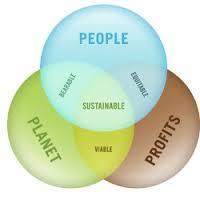An ESTEEM graduate school education includes a strong social entrepreneurship dimension, reflecting the rising attention to the triple bottom line and University of Notre Dame’s mission “to be a powerful force for good in the world.” ESTEEM is led by Director David Murphy, who is also the Associate Dean of Entrepreneurship for the Colleges of Science and Engineering. Murphy previously served for more than seven years as the Founding CEO of Better World Books, which originated at Notre Dame more than a decade ago and has become one of the leading for-profit social enterprises in the world. Arriving at Notre Dame in late 2011, Murphy has integrated social entrepreneurship in to both the ESTEEM curriculum as well as in to the entire student experience.
Social or environmental impact can become part of the core business model for some companies. The companies can be formally structured in several ways, such as not-for-profit, for-profit, a hybrid of the two. An increasingly popular structure is a for-profit “Benefit” corporation, or B-corp.
“My goal is that every student who comes to ESTEEM should know what social entrepreneurship is, how it works, what counts as success, and how we measure that success with full transparency and meaningful metrics,” Murphy says. “Whether in a formal class structure, workshops, through tours of companies or from hearing from leading practitioners in the entrepreneurial space (often working in concert with Notre Dame’s Gigot Center for Entrepreneurial Studies), we explain how unique and compelling business models can, in fact, deliver economic, social and environmental impact in support of the Common Good .”

“There’s a focus on ‘what are we doing for the common good?’ that’s embedded in a lot of the capstone thesis projects that are a core requirement of the ESTEEM Program,” Murphy says. “Some projects don’t lend themselves to that; some do by definition. Even for the people who are developing engineering apps or devices or anything out there, we’re trying to challenge them to say is there something about the business model you’re putting together that should be socially or environmentally impactful?”
Products and services designed to serve the very poor – a market of some 3 billion people that form the “Bottom of the Pyramid” – can achieve significant success, such as the Nobel Prize-winning entrepreneurial micro financing “product” created by Muhammad Yunus through the Grameen Bank in Bangladesh, for which he was awarded the Nobel Peace Prize in 2006.
There are opportunities to create a business model that is not aimed at the upper echelons of the developed world,” Murphy says. “These are the challenges we want to make our students aware of. ESTEEM is not a social enterprise or social entrepreneurship program, but that’s an integral part of what we try to teach at Notre Dame. “We are blessed with an extraordinary opportunity to teach and influence tomorrow’s leading entrepreneurs – and intrapraneurs – about the power of creating a sustainable business model to not only provide positive returns and impact - but to indeed change the world.”